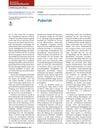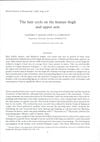 October 1971 in “The BMJ”
October 1971 in “The BMJ” Hair loss can be linked to hormonal changes, and physical conditions like heart defects can cause depression.
 1 citations,
October 1971 in “The BMJ”
1 citations,
October 1971 in “The BMJ” The document suggests that hair loss after stopping birth control may be similar to post-pregnancy hair loss and could recur with future pregnancies.
2 citations,
April 2023 in “Polymers” The study created 3D-printed pills that effectively release a hair loss treatment drug over 24 hours.
 19 citations,
October 1971 in “The BMJ”
19 citations,
October 1971 in “The BMJ” Anticonvulsant drugs may cause temporary chromosomal abnormalities.
 3 citations,
October 1993 in “The Journal of Dermatology”
3 citations,
October 1993 in “The Journal of Dermatology” The review suggests limited treatments for common hair loss conditions, with potential for future improvements.
 3 citations,
December 1997 in “Pediatric Clinics of North America”
3 citations,
December 1997 in “Pediatric Clinics of North America” Pediatricians should advise sexually active teens on safe sex and STD prevention, and discuss contraceptive options and their side effects.
 June 2022 in “C&EN global enterprise”
June 2022 in “C&EN global enterprise” The drug Olumiant is now approved to treat severe hair loss from alopecia and can also be used for some hospitalized COVID-19 patients.
 3 citations,
June 2020 in “Open access rheumatology”
3 citations,
June 2020 in “Open access rheumatology” A patient with Rhupus was diagnosed with Rowell syndrome and treated with various medications.

research Iron
January 2014 in “Reactions Weekly” A woman had nausea and constipation from iron pills taken for hair loss due to low iron.
 April 2024 in “MGM Journal of Medical Sciences”
April 2024 in “MGM Journal of Medical Sciences” Traditional Indian home remedies are effective and culturally important.
10 citations,
January 1967 in “PubMed” Oral contraceptives often cause melasma and other skin issues.
 November 2019 in “Monatsschrift Kinderheilkunde”
November 2019 in “Monatsschrift Kinderheilkunde” The document concludes that pediatricians play a vital role in supporting adolescents through puberty and should enhance their competence in this area.
 23 citations,
July 2021 in “International Journal of Pharmaceutics”
23 citations,
July 2021 in “International Journal of Pharmaceutics” New dissolving and implantable microneedle patches have been created for a long-lasting, non-invasive delivery of the drug finasteride.
 April 2020 in “Online journal of complementary & alternative medicine”
April 2020 in “Online journal of complementary & alternative medicine” Some medications can help increase sexual desire and function in women.
 July 2024 in “Journal of Pediatric Endocrinology and Metabolism”
July 2024 in “Journal of Pediatric Endocrinology and Metabolism” Ovarian hyperthecosis should be considered in young women with severe male-like symptoms and can be managed with hormone treatments.
 December 2011 in “Asia-Pacific biotech news”
December 2011 in “Asia-Pacific biotech news” In 2011, there were major scientific breakthroughs in cancer treatment, immunity, Parkinson's, virus simulation, schizophrenia, hair growth, lung cancer, and medical grafts.
 February 1998 in “Inpharma Weekly”
February 1998 in “Inpharma Weekly” Finasteride helps 83% of men maintain or increase hair count.
 1 citations,
October 2006 in “Journal of Family Planning and Reproductive Health Care”
1 citations,
October 2006 in “Journal of Family Planning and Reproductive Health Care” The contraceptive implant Implanon may be linked to hair loss, but the reported case of alopecia could be unrelated to the implant.
 52 citations,
September 1996 in “Obstetrics & Gynecology”
52 citations,
September 1996 in “Obstetrics & Gynecology” People often struggle to consistently use contraceptives and other medications, and long-acting options might be better for those who want to avoid daily doses.
112 citations,
April 2009 in “Cochrane library” Spironolactone may reduce excessive hair growth in women but its effectiveness for acne is not supported.
 4 citations,
August 2001 in “Epilepsia”
4 citations,
August 2001 in “Epilepsia” Treating epilepsy is complex, requiring careful drug choice and patient adherence to manage seizures and side effects.
 June 2022 in “Journal of Education, Health and Sport”
June 2022 in “Journal of Education, Health and Sport” The paper reviews acne treatments for women with PCOS but doesn't give specific advice.
 November 2013 in “Hair transplant forum international”
November 2013 in “Hair transplant forum international” Some generic finasteride may be counterfeit, leading to less effectiveness and increased hair loss.
 77 citations,
November 2007 in “International Journal of Andrology”
77 citations,
November 2007 in “International Journal of Andrology” Testosterone with or without finasteride doesn't improve thinking skills in older men with low testosterone.
 67 citations,
July 1985 in “British journal of dermatology/British journal of dermatology, Supplement”
67 citations,
July 1985 in “British journal of dermatology/British journal of dermatology, Supplement” Men's thigh hair grows longer and has a longer growth cycle than women's, but arm hair growth is similar between genders.
 5 citations,
January 1987 in “Gynecologic and obstetric investigation”
5 citations,
January 1987 in “Gynecologic and obstetric investigation” Cyproterone acetate implants were more effective at reducing facial hair and improving skin in severe hirsutism than oral treatment.
 22 citations,
August 2011 in “Endocrine Practice”
22 citations,
August 2011 in “Endocrine Practice” Most hirsutism cases are due to PCOS, and treatment focuses on lowering testosterone and blocking its effects.
 37 citations,
January 2009 in “Dermatology”
37 citations,
January 2009 in “Dermatology” Healthy women tend to lose more hair in July and April, and the least in February.
 6 citations,
October 2012 in “BMJ”
6 citations,
October 2012 in “BMJ” The woman's hair loss was mainly due to stress and low iron levels, and her hair grew back after treatment.
 2 citations,
August 1987 in “Australasian Journal of Dermatology”
2 citations,
August 1987 in “Australasian Journal of Dermatology” Birth control pills can cause skin issues but may help with acne and hirsutism, and choosing the right type can minimize side effects.



























